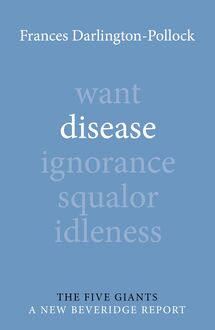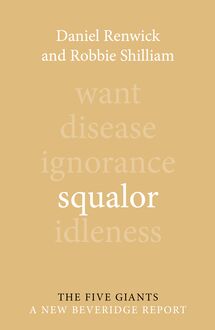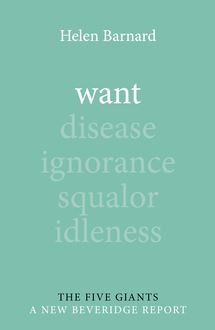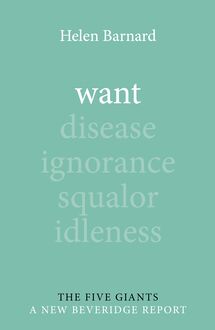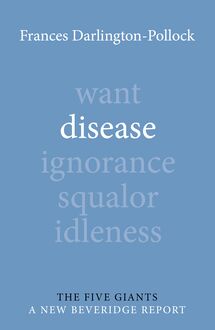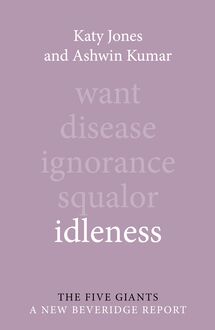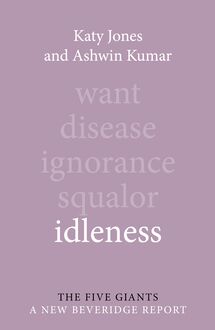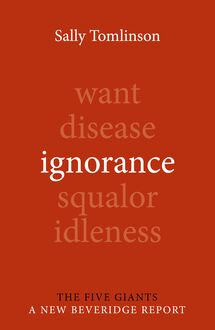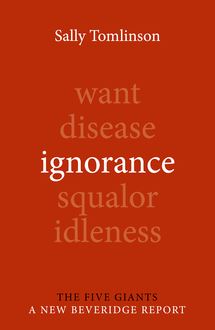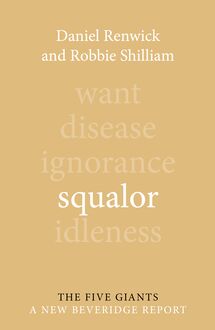-
 Univers
Univers
-
 Ebooks
Ebooks
-
 Livres audio
Livres audio
-
 Presse
Presse
-
 Podcasts
Podcasts
-
 BD
BD
-
 Documents
Documents
-
- Cours
- Révisions
- Ressources pédagogiques
- Sciences de l’éducation
- Manuels scolaires
- Langues
- Travaux de classe
- Annales de BEP
- Etudes supérieures
- Maternelle et primaire
- Fiches de lecture
- Orientation scolaire
- Méthodologie
- Corrigés de devoir
- Annales d’examens et concours
- Annales du bac
- Annales du brevet
- Rapports de stage
La lecture à portée de main
Découvre YouScribe en t'inscrivant gratuitement
Je m'inscrisDécouvre YouScribe en t'inscrivant gratuitement
Je m'inscrisEn savoir plus
En savoir plus

Description
In 1942 life expectancy at birth was 66 for women and 60 for men. Death was usually due to degenerative and infectious diseases. The greatest postwar success in the fight against disease was the establishment of the NHS and care that was free at the point of delivery. Life expectancy rose dramatically, but since 2011 incremental improvements have stalled and even, in some regions, begun to reverse. Infant mortality rates have crept up and the postcode lottery of health provision underscores the level of social inequality in the UK.
Good health is not simply the absence of disease. It is the collective of physical, social and mental well-being. It is the product of nutrition and genetics, of healthy lifestyles and preventative health interventions. It is the interaction between the conditions in which we live, work, play and age. Yet access to many of the things that make and keep us healthy are not evenly distributed in the population. Achieving good health is then deeply entwined with all aspects of society and cannot simply be solved by policies in one area alone.
In our rediscovery of Beveridge, the shadow of the pandemic looms large. It is has never been more urgent to address the underlying causes of Disease. And it has never been clearer that these determinants are not only social or physiological, but also political.
1. Introduction: a revolutionary moment
2. Disease: an evolving giant
3. Unequal health and the behemoth of today
4. From cradle ...
5. ... to grave: the problem of age
6. Inequity and inferiority: a dismantled health and social care service
7. Continuing challenges, contemporary crises
8. Shoring up “Assumption B”
Sujets
Informations
| Publié par | Agenda Publishing |
| Date de parution | 20 octobre 2022 |
| Nombre de lectures | 0 |
| EAN13 | 9781788213929 |
| Langue | English |
| Poids de l'ouvrage | 1 Mo |
Informations légales : prix de location à la page 0,1250€. Cette information est donnée uniquement à titre indicatif conformément à la législation en vigueur.
Extrait
DISEASE
“This is an important and illuminating book that sheds light on
two persistent and intractable calamities – our alarmingly low
levels of population health and the injustice of inequalities in
health. Read this book and feel your outrage, then read it again to
focus on what we need to do to create transformative change.”
KAtE PIcKEtt, Professor of Epidemiolog y,
University of York, and co-author of The Spirit Level
“This conceptually and empirically rich book outlines how health
and disease have been unequally experienced across the country both
before and during the Covid-19 pandemic. It argues powerfully that we
cannot go back to ‘business as usual’ and should instead harness a new
‘spirit of ’45’ to truly build back beter and reduce health inequalities.”
clArE BAmBrA, Professor of Public Health,
Newcastle University
“Fran Pollock sets out the hard truth of how political choices
have deprioritized ordinary people’s health w and ell-being and
sets out how we can stand together to oblige leaders to protect
us all. Reading her book shocks but also empowers us to act.”
BEn PhIllIPS, author of How to Fight InequalityFIvE GIAntS: A nEw BEvErIDGE rEPort
Consultant editor: Danny Dorling, University of Oxford
In November 1942, William Beveridge published Social Insurance and Allied
Services, the result of a survey work commissioned the year before by the
wartime coalition government. In what soon became known as simply
“The Beveridge Report”, fve impediments to social progress were
identifed: the giants of Want, Disease, Squalor, Ignorance and Idleness. Tackling
these giants was to be at the heart of postwar reconstruction. The welfare
state, including national insurance, child allowances and the National
Health Service, was a direct result of Beveridge’s recommendations.
To mark the eightieth anniversary of the Report’s publication, the
authors in this series consider the progress made against Beveridge’s
giants, and whether they have diminished or risen up to again stalk the
land. They also refect on how the fght against poverty, unft housing,
ill-health, unemployment and poor education could be renewed as the
countries of the UK emerge from a series of deeply damaging, divisive and
impoverishing crises.
As an establishment fgure, a Liberal and a eugenicist, Beveridge was
an unlikely coordinator of the radical changes that improved so many
peoples’ lives. However, the banking crisis at the end of the 1920s, the
mass unemployment and impoverishment of the 1930s, and the
economic shock of the Second World War changed what was possible to what
became essential. Old certainties were swept aside as much from within
the existing order as from outside it.
The books explore the topic without constraint and the results are
informative, entertaining and concerning. They aim to ignite a broader
debate about the future of our society and encourage the vision and
aspiration that previous generations held for us.
Want by Helen Barnard
Disease by Frances Darlington-Pollock
Squalor by Daniel Renwick and Robbie Shilliam
Ignorance by Sally Tomlinson
Idleness by Katy Jones and Ashwin KumarDISEASE
Frances Darlington-Pollock
agenda
publishingIn memory of Jonathan
For whom people meant more than politics.
Deeply loved and deeply missed.
© Frances Darlington-Pollock 2022
This book is copyright under the Berne Convention.
No reproduction without permission.
All rights reserved.
First published in 2022 by Agenda Publishing
Agenda Publishing Limited
The Core
Bath Lane
Newcastle Helix
Newcastle upon Tyne
NE4 5TF
www.agendapub.com
ISBN 978-1-78821-391-2
ISBN 978-1-78821-392-9 (ePDF)
ISBN 978-1-78821-393-6 (ePUB)
British Library Cataloguing-in-Publication Data
A catalogue record for this book is available
from the British Library
Typeset in Nocturne by Paty Rennie
Printed and bound in the UK by CPI Group (UK) Ltd,
Croydon, CR0 4YYContents
Acknowledgements vii
1. Introduction: a revolutionary moment 1
2. Disease: an evolving giant 13
3. Unequal health and the behemoth of today 31
4. From cradle . . . 49
5. . . . to grave: the problem of age 69
6. Inequity and inferiority: a dismantled health
and social care service 85
7. Continuing challenges, contemporary crises 103
8. Shoring up “Assumption B” 121
References 139
Index 150Acknowledgements
Many of the debates and underpinning ideas within this book are
things I have been thinking on for a long time. Over the years,
colleagues and friends have played a role in shaping, challenging and
furthering those arguments and I thank them for that. But there
are some people who have played a more formative role in this
book, and they deserve particular mention. First and foremost,
my editor Alison Howson. She understood my vision and gave me
direction and constructive critique when needed. Danny Dorling
for the opportunity and review. Herb for the discussion and
comments on earlier drafts. And fnally, thank you to Deborah, Paul,
Claire and Alex for their encouragement and support.
The views presented in this book are my own, and do not
necessarily represent those of my employers or afliated organizations.
Frances Darlington-Pollock
vii1
Introduction: a revolutionary moment
A revolutionary moment in the world’s history is a time for
revolution, not for patching.
Beveridge, Social Insurance
and Allied Services
In 1969, Johan Galtung introduced the concept of “structural
violence”. He urged that we consider how and in what ways violence
could be construed as more than the physical act of harm from
one body to another, and how the very society we inhabit acts to
prevent people from realizing their full potential. In establishing
this expanded concept of violence, Galtung ofered a defnition
which is strikingly resonant today: “if a person died from
tuberculosis in the eighteenth century it would be hard to conceive of this
as violence since it might have been quite unavoidable, but if he
dies from it today, despite all the medical resources in the world,
then violence is present” (Galtung 1969: 168). What of today?
December 2019 saw the emergence of a new, highly infectious
disease targeting the lungs and other organs to devastating efect.
Alarm grew in the scientifc and medical community as to both
its severity and transmissibility, with the rise of outbreaks in care
homes and hospitals fagged to the UK government as early as
January 2020 (Blanchard 2020). This failed to translate into
political action. Two years into the pandemic and more than 150,000
12 DISEASE
people had died from Covid-19 in the UK alone. Many of these
deaths were avoidable.
Ignoring warnings from ofcially appointed scientifc experts,
in the early days of the pandemic the UK government chose not
to mandate testing older people Cofor vid-19 when discharged
from hospital back into residential care. The consequences were
severe: 40 per cent of the 48,213 people who died from Covid-19
in the frst wave (mid-March to mid-June 2020) were care home
residents (Scobie 2021). As late as 3 March 2020, Prime Minister
Boris Johnson was boasting about shaking hands with “e -very
body” in a Covid-19-infected hospital (Weaver 2020). But as the
pandemic unfolded, the rising rates of infection and mounting
death toll forced action. Escalating messages to “shield”, avoid
public transport and practice good hygiene and social distancing
gave way to national lockdowns. However, preventative
measures to halt the spread of the deadly virus all favoured the more
privileged segments of society. A new hierarchy of employment
emerged, with those occupations deemed as essential operating
at the coalface of the pandemic and bearing the brunt of the risk.
Desperate atempts to ensure compliance with the much-needed
public health measures introduced saw political messaging
appeal to the public’s love of the National Health Service (NHS):
“Stay home, protect the NHS, save lives”. At the same time, the
prime minister and his early blasé atitude to public health advice
remained apparent throughout much of the pandemic. Regular
maskless media appearances paled into insignifcance, however,
amid the scandal of his and his inner-staf ’s extensive socializing
in the depths of social-distancing rules. It was one rule for them
and another for us.
The structural violence exposed Coby vid-19 is impossible
to ignore, wrought through the vulnerabilities of a diminished
and diminishing welfare state, the policies that deny those
most in need and the political rhetoric which in turn demonizes
those already sufering. But emergent in that crisis were signs IntroDuctIon: A rEvolutIonAry momEnt 3
of a political atempt at renewal, reminiscent of the aims of the
Commitee on Reconstruction Problems set up some 80 years
before. In November 1942, Sir William Beveridge presented this
commitee with a radical blueprint for what rapidly became one
of the most admired manifestations of the welfare state around
the world. Rather than the devastation of a pandemic, this
commitee was tasked with charting a path out of the instability of a
collapsing empire and the ravages of two successive world wars.
Targeting “fve giants” that stood between a fourishing society
and the “road to reconstruction” in the aftermath of war – Want,
Disease, Ignorance, Squalor and Idleness – Beveridge’s report
called for a revolutionary approach: a system of social security
built on the principle of meaningful cooperation between the state
and the individual. It was truly revolutionary, levying bipartisan
support to rebuild a beter Britain, supporting the population from
cradle to grave. But as the decades passed, the reputation of
something once so admired has seriously diminished. The Covid-19
pandemic’s destructive, uneven sweep through the population
exposed deep chasms in the manner of welfare provision in the
UK, exacerbating the sufering of many still reeling from
-
 Univers
Univers
-
 Ebooks
Ebooks
-
 Livres audio
Livres audio
-
 Presse
Presse
-
 Podcasts
Podcasts
-
 BD
BD
-
 Documents
Documents
-
Jeunesse
-
Littérature
-
Ressources professionnelles
-
Santé et bien-être
-
Savoirs
-
Education
-
Loisirs et hobbies
-
Art, musique et cinéma
-
Actualité et débat de société
-
Jeunesse
-
Littérature
-
Ressources professionnelles
-
Santé et bien-être
-
Savoirs
-
Education
-
Loisirs et hobbies
-
Art, musique et cinéma
-
Actualité et débat de société
-
Actualités
-
Lifestyle
-
Presse jeunesse
-
Presse professionnelle
-
Pratique
-
Presse sportive
-
Presse internationale
-
Culture & Médias
-
Action et Aventures
-
Science-fiction et Fantasy
-
Société
-
Jeunesse
-
Littérature
-
Ressources professionnelles
-
Santé et bien-être
-
Savoirs
-
Education
-
Loisirs et hobbies
-
Art, musique et cinéma
-
Actualité et débat de société
- Cours
- Révisions
- Ressources pédagogiques
- Sciences de l’éducation
- Manuels scolaires
- Langues
- Travaux de classe
- Annales de BEP
- Etudes supérieures
- Maternelle et primaire
- Fiches de lecture
- Orientation scolaire
- Méthodologie
- Corrigés de devoir
- Annales d’examens et concours
- Annales du bac
- Annales du brevet
- Rapports de stage
